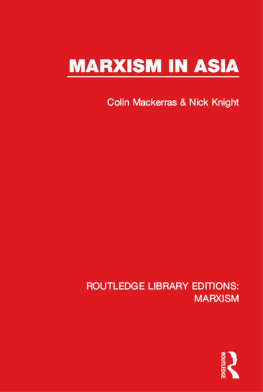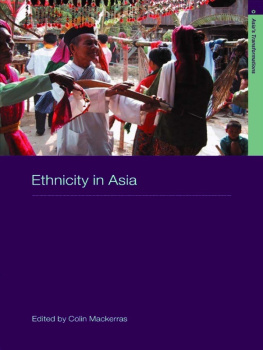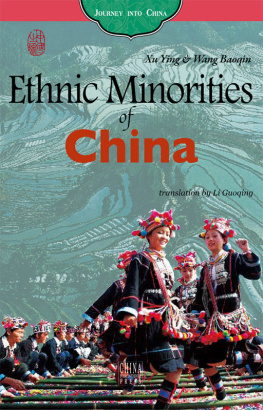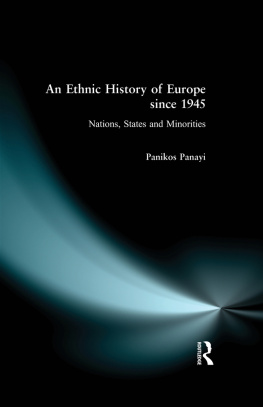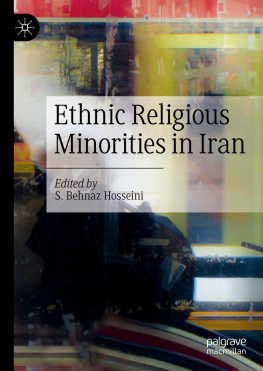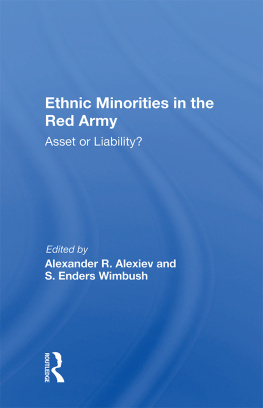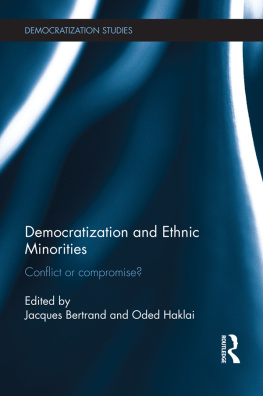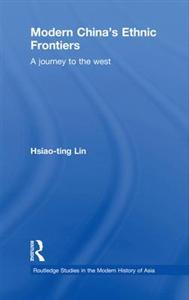Chinas Ethnic Minoritiesand Globalisation
Chinas fifty-five officially recognised ethnic minorities form over 8 per cent of the Chinese population, with over 100 million people, and occupy some 60 per cent of Chinas territory. They are very diverse, and the degree of modernisation among them varies greatly. This book examines the current state of Chinas ethnic minorities at a time when ethnic affairs and globalisation are key forces affecting the contemporary world. It considers the fields of policy, economy, society and international relations, including the impact of globalisation and outside influences.
Colin Mackerras is Foundation Professor in the School of International Business and Asian Studies, Griffith University, Australia. A leading China specialist, his research work focuses on two main areas: Chinas ethnic minorities, and its regional theatre, especially Peking Opera.
Chinas Ethnic Minoritiesand Globalisation
Colin Mackerras
First published 2003
by RoutledgeCurzonv
11 New Fetter Lane, London EC4P 4EE
Simultaneously published in the USA and Canada
by RoutledgeCurzon
29 West 35th Street, New York, NY 10001
This edition published in the Taylor & Francis e-Library, 2005.
To purchase your own copy of this or any of Taylor & Francis or Routledges collection of thousands of eBooks please go to www.eBookstore.tandf.co.uk.
RoutledgeCurzon is an imprint of the Taylor & Francis Group
2003 Colin Mackerras
All rights reserved. No part of this book may be reprinted or reproduced or utilised in any form or by any electronic, mechanical, or other means, now known or hereafter invented, including photocopying and recording, or in any information storage or retrieval system, without permission in writing from the publishers.
British Library Cataloguing in Publication Data
A catalogue record for this book is available from the British Library
Library of Congress Cataloging in Publication Data
Mackerras, Colin
Chinas ethnic minorities and globalisation / Colin Mackerras.
p. cm.
Includes bibliographical references and index.
1. Minorities China. 2. China Ethnic relations Political aspects.
I. Title.
DS730 .M33335 2003
305.8'00951dc21 2002036713
ISBN 0-203-18046-1 Master e-book ISBN
ISBN 0-203-34420-0 (Adobe eReader Format)
ISBN 0-;415309018 (Print Edition)
Preface
It is a truism to say that changes in the world at large, and in China in particular, have been enormous since the early 1990s. These changes have affected Chinas ethnic minorities and necessitated a reconsideration of many matters relating to them. Some of the particular aspects of Chinas minorities are covered in two earlier works that I completed in the early 1990s. These aspects are also treated in the present book, such as policy, international relations, economy and population. The material and interpretations come from a time period reflecting these recent changes. The term globalisation was already in widespread use, yet it had not yet assumed the status of grand narrative for interpreting the state of the world that it has come to occupy at the beginning of the twenty-first century.
Although I take full responsibility for any weaknesses or errors this book may contain, I should like to offer thanks to the many people who have helped me write it. The first to mention are the members of the minorities themselves, who have offered me friendship and cooperation in giving me the material that forms the basis of the book. Several Chinese organisations have made it possible for me to visit the ethnic areas of China, some of which are situated in places that are difficult to access, by making travel arrangements and offering necessary assistance. The Australian Research Council has given me several research grants that have enabled me to spend time in China and its ethnic areas, to buy books and other materials about Chinas minorities, and to undertake other research activities necessary for writing this book. My own university has been generous in granting me necessary leave and providing excellent research conditions, and my colleagues have always been supportive of my research and shared their ideas generously.
In the last few years I have taught a course at Griffith University entitled Minorities Questions in Asia, which has included quite a lot of material on China. I would like to thank the students who have taken this course; quite a few of them over the years. They have helped me frame my ideas on minorities issues, commented on lectures, taken part in discussions and given me insights of value to formulating and thinking through ideas and interpreting information. Finally, I should like to thank my family, who have offered criticisms and comments, given unstinting assistance and shared many ideas with me.
Colin Mackerras
Brisbane
June 2002
Abbreviations
ADB Asian Development Bank
BJP Bharatiya Janata Party
CCP Chinese Communist Party
CND China News Digest
GDI gender-related development index
HDI human development index
IMAR Inner Mongolian Autonomous Region
MPR Mongolian Peoples Republic
NATO North Atlantic Treaty Organisation
NBS National Bureau of Statistics
NCNA New China News Agency
NPC National Peoples Congress
PLA Peoples Liberation Army
PRC Peoples Republic of China
SDPC State Development Planning Commission
SSB State Statistical Bureau
TAR Tibetan Autonomous Region
UNDP United Nations Development Programme
WTO World Trade Organisation
XUAR Xinjiang Uygur Autonomous Region
1 Introduction
Among issues with the greatest impact on the world as a whole at the turn of the twenty-first century two of particular importance are ethnic relations and globalisation. The collapse of the Soviet Union at the end of 1991 produced a spectacular flow-on effect all over the world. Among many other factors, it saw a dramatic increase in ethnic wars and conflicts in many parts of the globe, while ethnic tensions intensified in a range of other countries.
Globalisation, or at least the less total form we might call internationalisation, has been important for a very long time. However, it gathered momentum greatly towards the end of the twentieth century. Its increasingly controversial nature became crystal clear at the World Trade Organisation (WTO) meeting in Seattle in November 1999, when demonstrators protesting against unchecked globalisation forced a postponement of a new trade round. The reasons for the protests will be taken up later in this chapter.
At the time China was in the late stages of active negotiations to join the WTO, having signed an agreement on entry with the United States earlier the same month. Negotiations had been lengthy and at times acrimonious. For China this success seemed a crowning achievement, since the United States was by far the most important and powerful of those countries with a say in whether China could join. There was considerable irony in the fact that China, which on many issues had once stood alongside ordinary people and against the power of governments, should now find itself aligned with powerful states against protestors. Quite a few hurdles stood in Chinas way to WTO membership, but its efforts were eventually crowned with success in December 2001.





